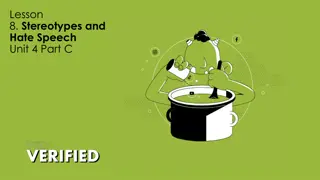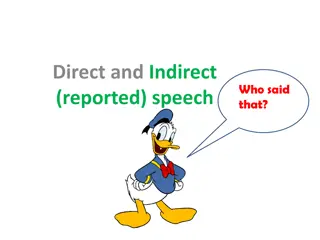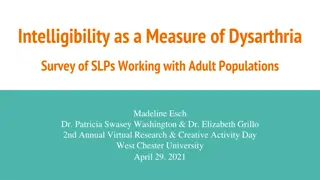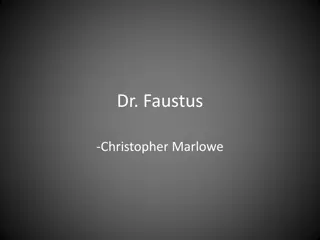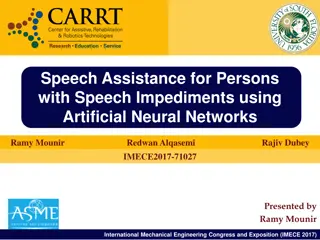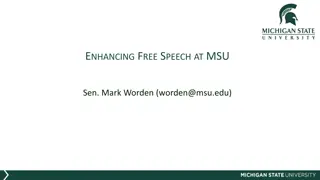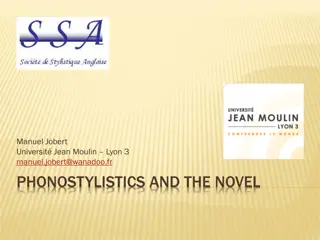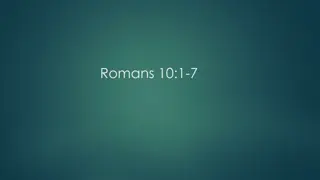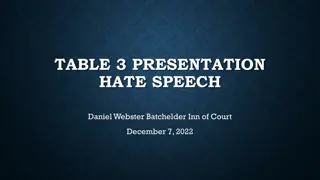The Final Speech of Christopher Marlowe's "Doctor Faustus": A Desperate Plea for Salvation
The final speech of Dr. Faustus in Christopher Marlowe's play "Doctor Faustus" is a poignant depiction of a man grappling with his impending damnation. Faustus moves from desperate pleas for more time to profound regrets and a deep sense of guilt. Unable to escape his fate, he seeks solace in vain, ultimately facing the eternal consequences of his actions.
Download Presentation

Please find below an Image/Link to download the presentation.
The content on the website is provided AS IS for your information and personal use only. It may not be sold, licensed, or shared on other websites without obtaining consent from the author.If you encounter any issues during the download, it is possible that the publisher has removed the file from their server.
You are allowed to download the files provided on this website for personal or commercial use, subject to the condition that they are used lawfully. All files are the property of their respective owners.
The content on the website is provided AS IS for your information and personal use only. It may not be sold, licensed, or shared on other websites without obtaining consent from the author.
E N D
Presentation Transcript
CHRISTOPHER MARLOWS Doctor Faustus Doctor Faustus A Play Of Deep Questions Concerning Morality, Religion, And Man's Relationship To God MA Ist Sem (Shakespeare) Paper III
THE FINAL SPEECH The final speech of Dr Faustus is the most emotionally powerful scene in the play. His despairing mind rushes from idea to idea. One moment he is begging time to slow down, the next he is imploring Christ for mercy. One moment he is crying out in fear and trying to hide from the wrath of God, the next he is begging to have the eternity of hell lessened somehow.
He curses his parents for giving birth to him but then owns up to his responsibility and curses himself. His minds various attempts to escape his doom, then, lead inexorably to an understanding of his own guilt.
The Clock strikes eleven. Faustus begins his final soliloquy. Ah, Faustus Now hast thou but one hour to live And then thou must be damned perpetually He pleads beautifully, and futilely, for time to stop its forward rush. Stand still, you ever-moving spheres of heaven That time may cease, and midnight never come
Faustus believes it is the movement of the spheres and stars that creates time. He realizes time cannot stop, and delivers these memorable lines "Oh, I'll leap up to my God who pulls me down? / See, see, where Christ's blood streams in the firmament. / One drop would save my soul, half a drop. Ah, my Christ!" (5.2.156-8). He has a vision of an angry God. He pleads with different aspects of nature to help him, but they can't.
He is so ashamed that he wants to hide himself from the vision of God Mountains and hills, come, come, and fall on me, And hide me from the heavy wrath (ire) of God! The clock strikes for half past the hour. He pleads that God will shorten his time in hell to a thousand, or even a hundred thousand years. Let Faustus live in hell a thousand years, Ahundred thousand, and at last be saved! But he knows that hell is eternal. O, no end is limited to damned souls!
He wishes that Pythagoras' theories of transmigration of souls (reincarnation) were true. He wishes that he could be an animal, whose souls are not immortal. Ah, Pythagoras metempsychosys, were that true,This soul should fly from me, and I be changdUnto some brutish beast! All beast are happy. For when they die,Their souls are soon dissolvd in elements (earth, water, air and fire
He curses his parents, then curses himself, and finally curses Lucifer. Cursed be the parents that engendered me! No, Faustus, curse thyself, Curs Lucifer( WHY?)That hath deprived thee of the joy of heaven.
The clock strikes midnight. With thunder and lightning scarring the skies, he cries aloud for his soul to dissolve into the air, or drops of water, so that the devils cannot find it. O soul, be changed into little water-drops Andfall into the ocean, never be found! The devils enter. As Faustus begs God and the devil for mercy, the devils drag him away
In his final speech, Faustus is clearly sufferingfrom remorse, yet he no longer seems to be ableto repent.
The ending of Doctor Faustus represents a clash between Christianity, which holds that repentance and salvation are always possible, and the dictates of tragedy, in which some character flaw cannot be corrected, even by appealing to God. The idea of Christian tragedy, then, is paradoxical, as Christianity is ultimately uplifting. People may suffer as Christ himself did but for those who repent, salvation eventually awaits
To make Doctor Faustus a true tragedy, then, Marlowe had to set down a moment beyond whichFaustus could no longer repent, so that in thefinal scene, while still alive, he can be damnedand conscious of his damnation
Three Scholars Enter the three Scholars. They've been much disturbed by all of the terrible noise they heard between midnight and one. They find Faustus body, torn to pieces.
The Chorus The Chorus emphasizes that Faustus is gone, hisonce-great potential wasted. The Chorus warns the audience to remember his fall, and the lessons itoffers.
THANK YOU! THANK YOU!
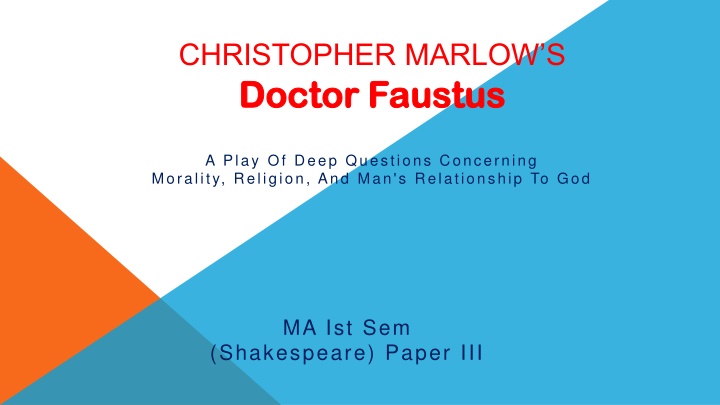

![Prevention and Combating of Hate Crimes and Hate Speech Bill [B.9B.2018]](/thumb/60513/prevention-and-combating-of-hate-crimes-and-hate-speech-bill-b-9b-2018.jpg)
